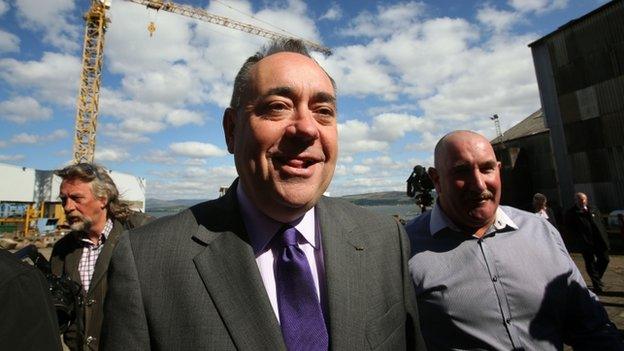Scottish independence: Cameron promises more powers for Scotland 'soon'
- Published
David Cameron was speaking to BBC political editor Nick Robinson
Holyrood would get further powers "soon" if there is a "No" vote to independence, David Cameron has said.
Mr Cameron said more devolution would allow MSPs to make "further decisions to help growth and jobs".
The prime minister said voting to stay in the UK was "the right choice" for Scotland's businesses and its people.
Scottish First Minister Alex Salmond challenged Mr Cameron to name a single job-creating power certain to come after a "No" vote.
Mr Cameron later delivered an address to the CBI annual dinner in Glasgow as the referendum campaign entered its final weeks.
BBC political editor Nick Robinson asked Mr Cameron if he would guarantee more powers in the event of a "No" vote and, if so, when.
The prime minister replied: "Yes and soon is the very short answer to that."

Analysis
Douglas Fraser, BBC Scotland's business and economy editor

What's in the referendum shop window for business?
"When you look at the policies on offer for business, comparing the Scottish government's White Paper on independence with the current policies pursued at Westminster, there are large areas where there is not much difference.
"For instance, the SNP administration talked in its recent "Re-industrialising Scotland" paper about using the policy levers available through independence to focus on strengthening manufacturing, promoting innovation and encouraging international trade and investment.
"The coalition government at Westminster can sign up to that, as could its Labour rivals.
"In more detail, there's talk of an innovation agency; a business development bank; a long-term target for more manufacturing output; a more efficient tax system with targeted tax breaks for business; linking skills to industrial priorities; encouraging more collaboration; nd an international network for export promotion.
"Not much disagreement on any of that from parties at Westminster."

Responding to Mr Salmond, Mr Cameron argued that the Scottish Parliament already had powers to create jobs and further "fiscal devolution" planned by the Conservatives would enable Holyrood to make "further decisions to help growth and jobs here in Scotland".
In June, the Conservatives proposed that MSPs should get additional responsibility over VAT, income tax and welfare.
'Right choice'
Mr Cameron said: "The right choice for business, the right choice for Scotland's economy and the right choice for Scotland's people is to stay within the United Kingdom.
"It gives Scottish business the opportunity of trading throughout the United Kingdom and the single European market.
"It gives you the scale to make a difference on a world stage.
"But also you have the certainty, the knowledge that you keep the pound as your currency, you keep your markets open, you keep your business opportunities as you have them today."

Alex Salmond said independence would give Scotland a greater ability to create jobs
He added: "One of the many questions Alex Salmond hasn't been able to answer is what would Scotland's position be if people vote for separation.
"People in Scotland don't know what currency they would be using, they don't know how long they would have to queue up to get back into the European Union, they don't know what the position would be with borders and tariffs and everything else."
In his address to the CBI, Mr Cameron said: "Scotland does twice as much trade with the rest of the UK than with the rest of the world put together - trade that helps to support one million Scottish jobs."
He added: "This success doesn't happen by accident. It happens because of the skill of people in Scotland and the opportunities that come from being part of something bigger.
"A large domestic market, underpinned by a common currency, common taxes, common rules and regulations, with no borders, no transaction costs, no restrictions on the flow of goods, investment or people. Ours really is an economy of opportunity."
Debate challenge
Meanwhile, Mr Salmond has set out six job-creating powers for Scotland that he said were guaranteed with a "Yes" vote in the referendum:
Control over the business tax system
Control over finances
Control over Air Passenger Duty
Control over employment policy
Control over trade policy
Control over immigration policy
During their televised BBC debate on Monday, Mr Salmond had challenged Better Together head Alistair Darling to name three job-creating powers that were being offered to the Scottish Parliament by the pro-UK parties in the event of a "No" vote.
Speaking ahead of Mr Cameron's CBI speech, the first minister issued a similar challenge to the prime minister.
Mr Salmond told the BBC: "I think the prime minister is the 'No' campaign incarnate - 'let me run Scotland from London and I'll pay the occasional site visit to see how you're getting on'.
"Alistair Darling seems to have been shoved aside now - he's not even allowed on to the phone-ins, he's been replaced by (Labour MP) Douglas Alexander this morning - now he's been replaced, effectively, by David Cameron.
"The problem is, when is David Cameron going to have the guts to do what Alistair Darling has done, and that's to have a debate?"
Dinner spending
In another development, the Electoral Commission has asked the CBI for further information on its campaign activities, including the annual dinner which the prime minister addressed.
The CBI is not required to register as a formal campaigner if it spends less than £10,000 under the the spending rules, external for the referendum.
The elections watchdog has ruled that the dinner does constitute campaigning but said it had been assured that the cost will be within the spending limit.
In a letter to the pro-independence campaign group Business for Scotland, it said: "Information supplied to the Commission shows that the scale of the event is significantly reduced from previous years and from their original plan for this year, including a smaller guest list and lower catering."
A spokesman for the Electoral Commission said: "We will continue to monitor their activities to ensure that this remains the case and we will be obtaining from the CBI the final costs of the dinner after it has been held."
A CBI spokesman, asked if the business group had to rescind invitations to reduce the scale of the event, said: "All guests who had booked for the CBI dinner have had their tickets honoured."
Earlier this year, the CBI registered as a formal campaigner in the referendum, and then withdrew after the move prompted more than a dozen members to resign or suspend their membership of the organisation.